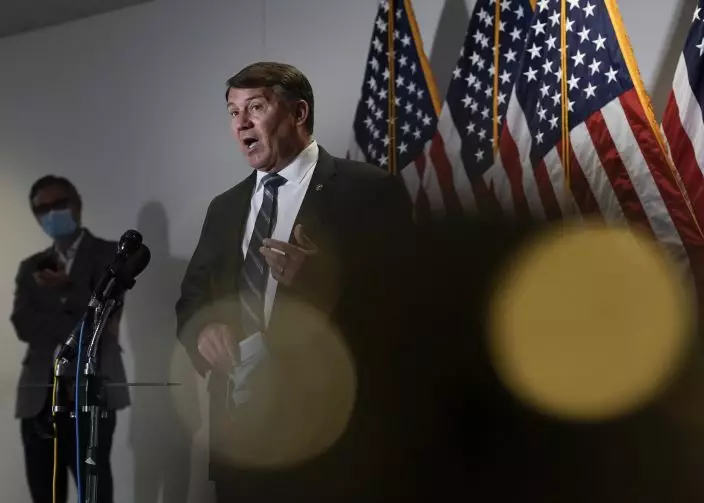Senate Republicans could vote as soon as next week on proposed policing changes, an abrupt shift of GOP priorities in an election year as the party rushes to respond to nationwide protests over the deaths of black Americans in interactions with law enforcement.
The emerging legislative package, along with President Donald Trump's executive actions announced Tuesday, are perhaps the most ambitious law enforcement changes considered by Republicans in decades. Skeptical Democrats, already on track for a House vote next week on a more robust overhaul of policing practices, pan the GOP proposals as inadequate, failing to meet the moment of national outcry sweeping cities nationwide.
The swift action shows how quickly the national debate has been upended less than a month since George Floyd's May 25 death in Minnesota.

Sen. Mike Rounds, R-S.D., takes questions from reporters about proposed policing reforms after President Donald Trump signed an executive order on police reform on Capitol Hill in Washington, Tuesday, June 16, 2020. (AP PhotoJ. Scott Applewhite)
Trump vowed a “big moment” if lawmakers could act. At a Rose Garden event for his executive actions, he declared himself “committed to working with Congress on additional measures.”
Senate Republicans are expected to meet behind closed doors for lunch Tuesday as the party's lone black senator, Tim Scott of South Carolina, prepares to roll out the legislation.
At the same time, the Senate Judiciary Committee was to conduct a hearing Tuesday afternoon on “police use of force and community relations,” drawing testimony from leading civil rights and law enforcement leaders.

Sen. Rand Paul, R-Ky., arrives for a weekly GOP strategy session on Capitol Hill in Washington, Tuesday, June 16, 2020. (AP PhotoJ. Scott Applewhite)
With the nation on edge — another black American, 27-year-old Rayshard Brooks, was shot and killed Saturday night at the hands of police in Atlanta — Scott had warned leadership not to push voting off until later this summer. A Republican familiar with the planning but unauthorized to discuss it said voting could happen as soon as next week.
Democrats, meanwhile, are watching warily. Sens. Cory Booker, D-N.J., and Kamala Harris, D-Calif., co-authors of the party's own sweeping proposal, led their colleagues Tuesday in seeking a more robust response.
“We are at the point in the United States where we are at a crossroads,” Booker said during a floor speech.

Sen. John Kennedy, R-La., a member of the Senate Judiciary Committee, takes questions from reporters about proposed policing reforms after President Donald Trump signed an executive order on police reform on Capitol Hill in Washington, Tuesday, June 16, 2020. (AP PhotoJ. Scott Applewhite)
Booker said the choice is between “meaningful reforms and symbolic measures that will do nothing to save people's lives.”
Several Democratic senators spoke on the Senate floor in favor of a more robust approach. Maryland Sen. Chris Van Hollen said “tinkering with the system will not be enough.”
The two bills emerging from Democrats and Republicans in Congress share many similarities, but they take different approaches in seeking to change police practices and boost accountability.
Both would establish a database of police use-of-force incidents, a proposal to improve transparency so the public can review the records of officers, even when they transfer from one jurisdiction to another.
Both bills are expected to change police procedures by placing restrictions on the use of chokeholds to detain suspects and bolstering the use of body cameras, among other measures. Chokeholds are already largely banned in police departments nationwide.
The Democratic bill, from the Congressional Black Caucus and introduced last week, goes much further by changing the federal statute governing officer misconduct, setting up a national police accreditation system and blocking the transfer of surplus military equipment to local police departments.
Scott's proposal, set to be released Wednesday, shifts money into police training and sets up an officer accreditation system and database of conduct.
The House Judiciary Committee is set to meet Wednesday to review the Democrats' bill.


